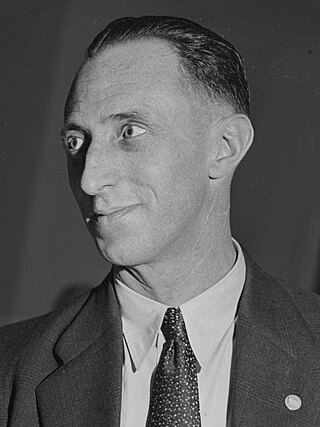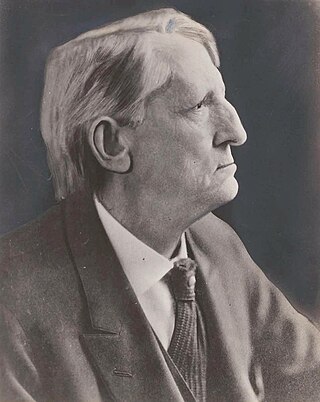
Harry Bridges was an Australian-born American union leader, first with the International Longshoremen's Association (ILA). In 1937, he led several chapters in forming a new union, the International Longshore and Warehouse Union (ILWU), expanding members to workers in warehouses, and led it for the next 40 years. He was prosecuted for his labor organizing and designated as subversive by the U.S. government during the 1930s, 1940s, and 1950s, with the goal of deportation. This was never achieved.

The 1934 West Coast waterfront strike lasted 83 days, and began on May 9, 1934, when longshoremen in every US West Coast port walked out. Organized by the International Longshoremen's Association (ILA), the strike peaked with the death of two workers on "Bloody Thursday" and the subsequent San Francisco General Strike, which stopped all work in the major port city for four days and led ultimately to the settlement of the West Coast Longshoremen's Strike.
The Office and Professional Employees International Union (OPEIU) is a trade union in the United States and Canada representing approximately 88,000 white-collar working people in the public and private sectors. It has members in all 50 US states, the District of Columbia, and Puerto Rico, as well as in one local in Canada.

Joseph Bruce Nelson (1940-2022) was a professor emeritus of history at Dartmouth College and noted labor historian and scholar of the history of the concepts of race and class in the United States and among Western European immigrants to the U.S.

Harrald Olaf Lundeberg was a merchant seaman and an American labor leader.

Andrew Furuseth of Åsbygda, Hedmark, Norway was a merchant seaman and an American labor leader. Furuseth was active in the formation of two influential maritime unions: the Sailors' Union of the Pacific and the International Seamen's Union, and served as the executive of both for decades.
The International Seamen's Union (ISU) was an American maritime trade union which operated from 1892 until 1937. In its last few years, the union effectively split into the National Maritime Union and Seafarer's International Union.
Terry Pettus was a newspaper reporter and activist from Seattle, Washington.
The Waterfront Workers History Project is a program of the University of Washington, which serves to document the history of workers and unions active on the ports, inland waterways, fisheries, canneries, and other waterfront industries of the western United States and Canada, specifically, California, Oregon, Washington, Alaska, and British Columbia. In collaboration with the Pacific Northwest Labor and Civil Rights History Projects, and sponsored by the Harry Bridges Center for Labor Studies, the Project is a collective effort to organize and present historical data covering significant events from 1894 to the current day.
The 1935Pacific Northwest lumber strike was an industry-wide labor strike organized by the Northwest Council of Sawmill and Timber Workers Union (STWU). The strike lasted for more than three and a half months and paralyzed much of the lumber industry in Northern California, Oregon and Washington state. Although the striking workers only achieved part of their demands, the repercussions of the long and often violent strike were felt for decades. Over the next several years, a newly radicalized and militant generation of lumber workers would go on to spark several more industry-wide strikes.

The International Longshore and Warehouse Union (ILWU) is a labor union which primarily represents dock workers on the West Coast of the United States, Hawaii, and in British Columbia, Canada; on the East Coast, the dominant union is the International Longshoremen's Association. The union was established in 1937 after the 1934 West Coast Waterfront Strike, a three-month-long strike that culminated in a four-day general strike in San Francisco, California, and the Bay Area. It disaffiliated from the AFL–CIO on August 30, 2013.
Shaun "Jack" Maloney (1911–1999) was an American labor activist active in the Midwestern United States in the 20s and 30s and the West Coast of the United States after 1942. Though he was best known for his role in the 1934 Minneapolis Teamster Strike, Maloney was also an important figure in the International Longshore and Warehouse Union in the 1970's.
Chris Delarna Mensalvas, also archived as Chris D. Mensalvas and Chris D. Mensalves was a Filipino American union organizer most active during the 1940s and 1950s. A communist and leader of the immigrant Filipino labor movement in the Pacific Northwest, Mensalvas was closely associated with famous Filipino American author and activist Carlos Bulosan as well as Ernesto Mangaoang and Philip Vera Cruz.

Ferdinand Smith was a Jamaican-born Communist labor activist. A prominent activist in the United States and the West Indies, Smith co-founded the National Maritime Union with Joseph Curran and M. Hedley Stone. By 1948 he was wanted by the U.S. Immigration Service for deportation, and is remembered as one of the most powerful black labor leaders in U.S. history.
Ronald "Ron" Magden was a historian from Tacoma, Washington who specialized in maritime labor history and Japanese-American history in the Puget Sound region.
Phillip (Phil) Lelli was a longshore worker, union activist, and philanthropist from Tacoma, Washington. Lelli was president of ILWU, local 23, for four nonconsecutive terms between 1966 and 1985.
Jerry Tyler was a longshore worker, labor activist, and radio personality from Seattle, best known for being the host of a popular radio show Reports From Labor, which ran from 1948 to 1950.
The 1916 West Coast waterfront strike was the first coast-wide strike of longshore workers on the Pacific Coast of the United States. The strike was a major defeat for the International Longshoremen's Association, and its membership declined significantly over the next decade. Employers won control over hiring halls and started a campaign to drive out the union's remaining presence.
Ross Rieder was a labor activist and historian from Washington state.
Earl George was a leader in the Communist Party and International Longshore and Warehouse Union, photographer, and civil rights activist from Seattle.







